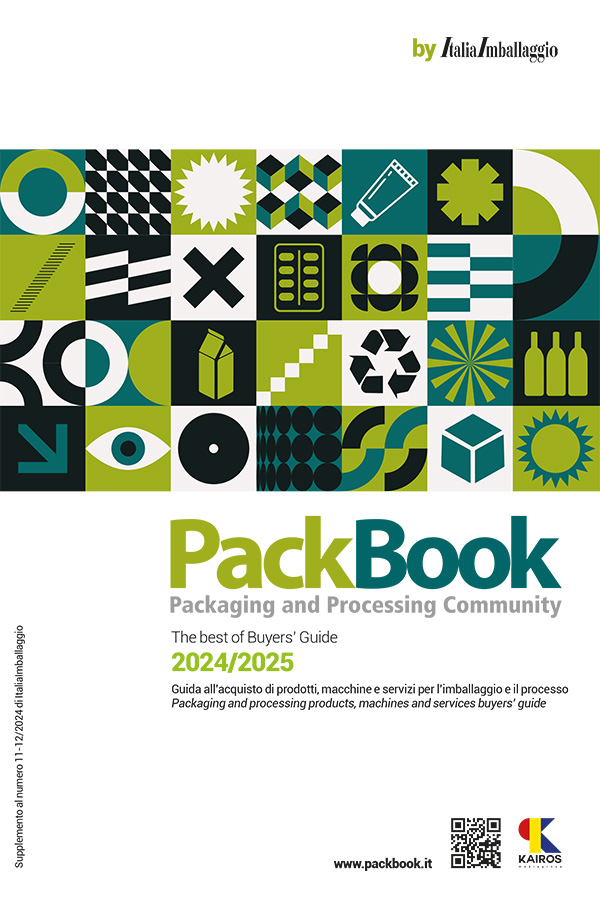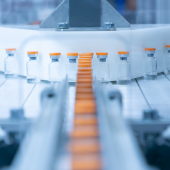Re-starting

Let's start again from ... 2*. The start of the fateful and longed for "Phase 2" in Italy has foreseen a generalized recovery of production and commercial activities. The national (and international) packaging industry has never actually closed the doors of its factories, but has indeed responded with determination to the requests of the community, asserting its strategic value on the field in times of the Covid-19 emergency.
Data and facts from the real world, amidst difficulties and signs of encouragement.
Luciana Guidotti
* A quotation freely inspired by an Italian film of some years back ... "Let's start again from 3" said the dreamer Massimo Troisi to a pragmatic Lello Arena.
"Troisi: What has been has been ... enough, I start from three ...
Arena: From scratch you mean!...
"Troisi: Eh? ...
Arena: From scratch: I start from scratch.
"Troisi: No sir, I start from ... ie ... I managed to succeed in three things in life, why should I also jettison them? Why should I start from scratch? I want to start from three! ".

For a few months, the world has ceased its headlong rush ... We listen to the silence of the cities, mourn the misfortunes of many and the failures of all too many, to trace out the boundaries of a future not free of tension and uncertainties...
Hence the worldwide Corona virus health emergency would therefore seem to have torn apart the social and economic framework, painstakingly built over years of relative well-being in different parts of the globe, requiring the redesign of the rules of peaceful cohabitation.
Will we be able to get back on track? The question is a must and the answer must necessarily be "yes", regardless of the time it takes.
EACH TO THEIR OWN
By narrowing the field of observation to the industrial forces of the packaging supply chain, as reporters we have closely followed the reactions of many companies that, fielding specific skills and resources , have been at the forefront in providing the right support to FMCG producers, food and pharmaceuticals first of all (fully documented on our websites packmedia.net and italiaimpackage.net).
Of these companies, we want to underline the speed of reaction in managing the complexity of the moment, with the aim of also safeguarding, together with production continuity, our own human capital and more generally public health: reconversion of existing plants to create and package protective devices, donations of various sizes and in various forms, support for workers and territories, creating new and effective ways of communicating with the market or remote assistance to customers via previous investments in digitization…
And this is an attitude that has united machine and packaging materials manufacturers, a mode of doing business that continues to look ahead.
THOSE WHO FALTER ARE LOST
That packaging companies can - and must - continue to drive our country system, was also clearly stated by Nomisma in the recent "Controvento" [countertrend] research, illustrated via webinar to over 600 operators on 7 May.
- Under observation 71,115 companies, which represent 14% of the Italian manufacturing sector and which in 2018 expressed revenues of 741.3 Bln (70% of the sector) giving work to 2.3 million employees (66% of the sector), with an added value of € 178 billion (around 10% of Italian GDP).
- After identifying some structural factors that guarantee a greater propensity for competitiveness (i.e. geographical location and company size) and defining the performance criteria with respect to the main economic and financial variables (revenues, EBITDA, added value ...), There are 4,829 so-called Contravento [countertrend] companies, those that perform better in practice. Packaging and pharmaceutical companies also feature among the "winning sectors" of this ranking.
- We read in the research that «... In particular in packaging, the concerns that feature as Controvento companies, are among the more-structured, larger ones, those with over 500 employees, while things do not look so good for the medium and small concerns. In the pharmaceutical sector, however, the size class does not appear to discriminate in ensuring greater relative competitiveness within the sector itself».
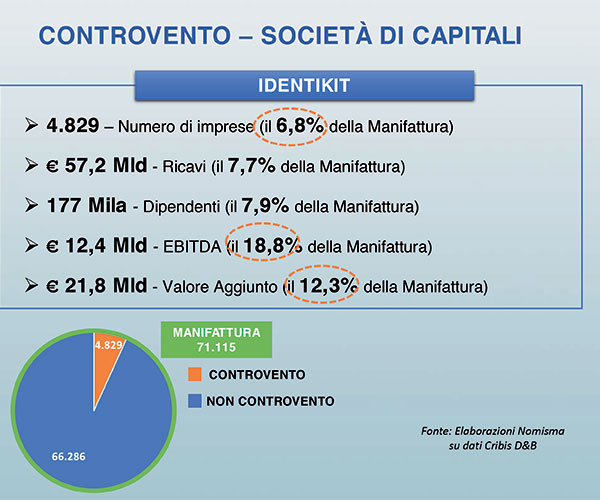
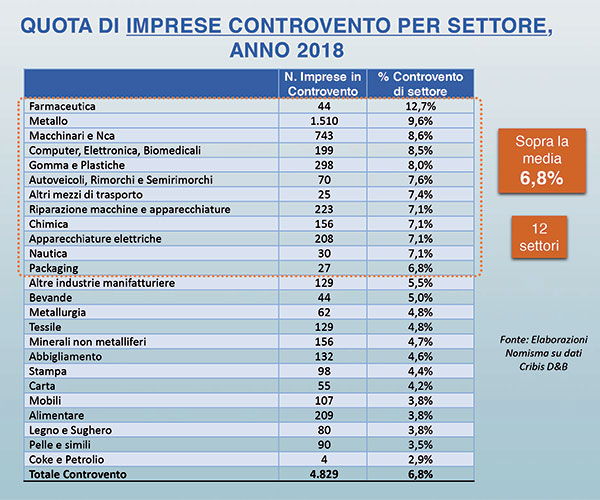
- The generation and accumulation of a liquidity buffer and the maintenance of a solid financial and capital structure also become essential in facing any downturn situation , such as for example the current COVID-19 emergency. In this sense, the cash equivalents generated and also maintained for sudden financial needs have become the key to the survival of companies (these aspects were analyzed by Crif-Rating in a study presented during the Nomisma webinar).
- Therefore, the question Lucio Poma, Nomisma's Scientific Director of Industry and Innovation, is not rhetorical about the importance of the "Controvento" analysis at a time when the country has to face the Corona Virus emergency «as it becomes more than ever essential that the group of companies driving the country don't lose too much momentum. If this leading group were to lose ground significantly, the damage would be incalculable».
Automatic machines:let's face reality
- The survey carried out between March and April 2020 by MECS, UCIMA market analysis company (and presented at the same time as Controvento) shows the substantial stability of the "packaging" sector, without, however, obviously underestimating the unknowns posed by the emergency.
- The significant participation of companies in the survey here enables one to draw a reliable picture of the situation, providing important indications both in relation to the first quarter and with respect to the forecasts for the whole of 2020.
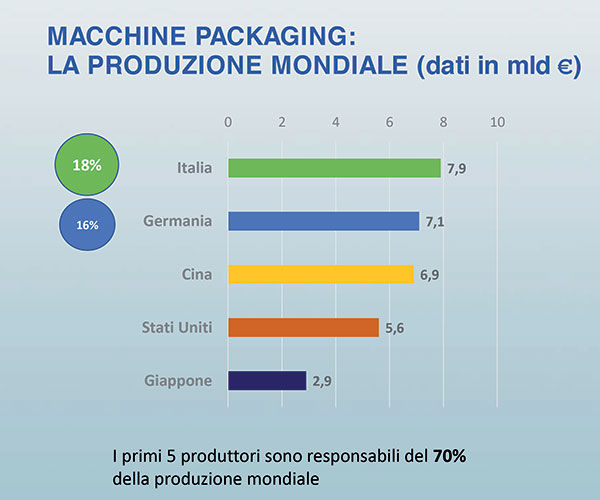
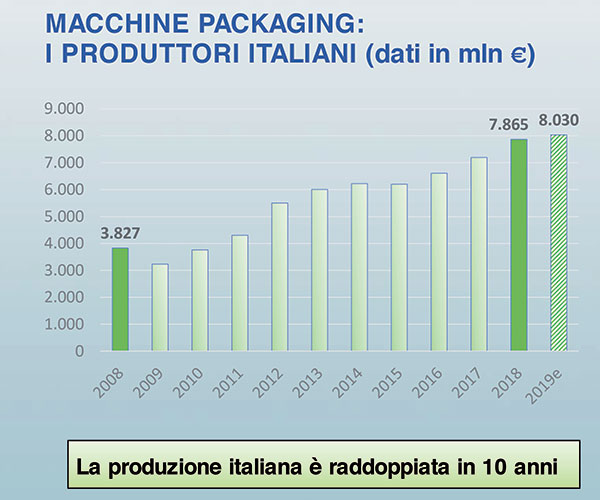
-
In the light of the data collected from 165 packaging machines and systems manufacturers, Luca Baraldi (MECS-Confindustria Ucima study center) enters into the merits of the analysis (of which we give a summary), and recalls that, globally in 2019, the the sector has developed a turnover of around 45.5 billion Euros (CAGR of 5.2% between 2015 and 2019).
In this context, with the 8 billion turnover recorded in 2019, Italy has maintained the leading position of the ranking, overtaking its German competitors. - During the emergency, Italian packaging companies never stopped production: only 4 out of 100 did so, while 1 out of 5 declared a slowdown in commercial and after-sales activities, without ever interrupting production.
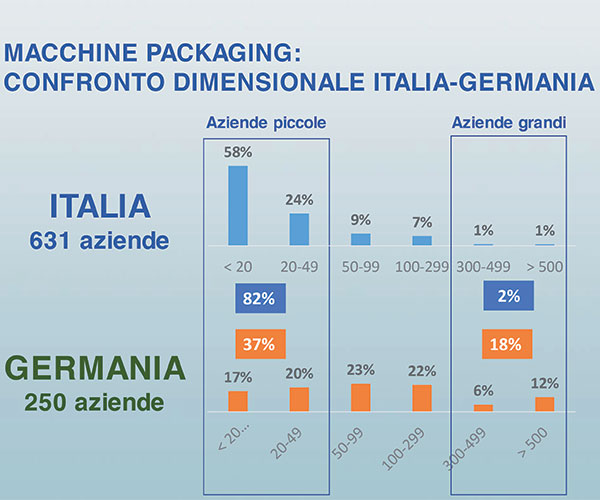
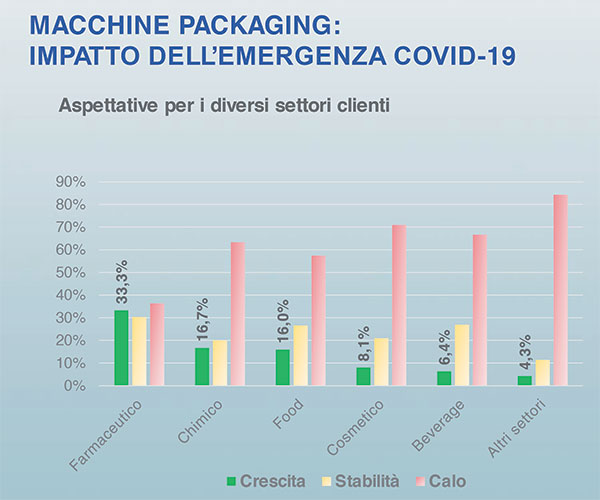
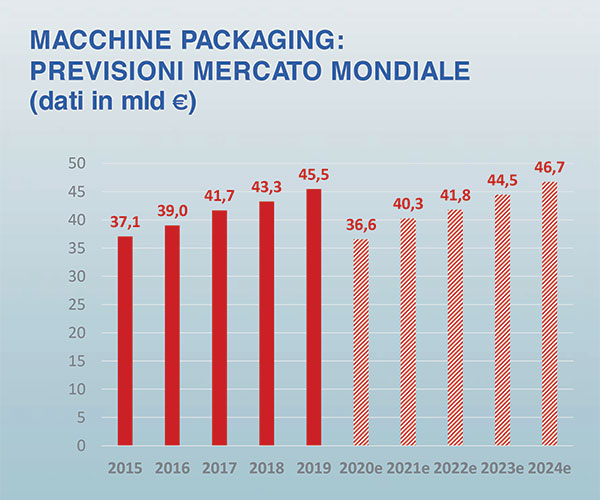
- All of them have introduced safeguard measures for their employees: smart working, holidays, diversified shifts and access to social safety nets have "impacted" on business productivity for 9 out of 10 companies.
- The problems related to subcontracting have caused slowdowns for 8 out of 10 companies although, in most cases, the packaging companies have supported their historical suppliers, as a heritage to be safeguarded. 1 out of 10 companies have been forced to change supplier.
- From the beginning of the emergency to the beginning of May, only 1 out of eight companies (12.9%) reported some signs of increased demand (especially from the food, pharmaceutical and chemical sectors); overall, 80% of the sample estimates a sharp drop in production, turnover and orders, with a contraction of more than 25% for half of the companies and more than 50% for a significant share of companies (14.2% of the turnover , 24.1% on orders);
- The negative forecasts for the whole of 2020 are corroborated: 86.7% of companies estimate that the impact of the emergency will result in a drop in turnover and for 50% of the sample it will be a heavy drop.
The only sector for which signs of improvement are visible is the pharmaceutical sector, where expectations of stable or growing results (63.6%) exceed those of worsening (36.4%).
Summing up
Summing up, it seems to us correct to underline that the overall picture presented is in all probability affected by the emotions of people called to express themselves in an exceptional moment in terms of unpredictability and scope.
Already, after a month, we are in fact collecting different signals that partially mitigate what emerged from the Ucima survey. Thus, in the following pages, we present some case histories that open up new perspectives.
For our part, we thank those who have accepted our invitation to tell about their industrial and human experience, sharing emotions and future strategies.
